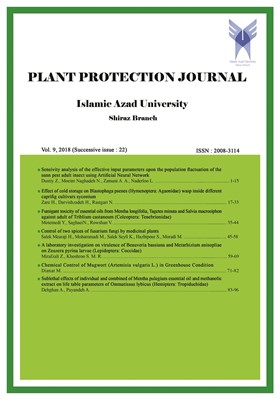Fumigant toxicity of essential oils from Mentha longifolia, Tagetes minuta and Salvia macrosiphon against adult of Triblium castaneum
Subject Areas : Plant Protection
Yasamin Motemedi
1
,
Nazila Saghaei
2
*
![]() ,
Vahid Rowshan
3
,
Vahid Rowshan
3
1 - Department of Entomology, Jahrom Branch, Islamic Azad University, Jahrom, Iran
2 - Department of Entomology, Marvdasht Branch, Islamic Azad University, Marvdasht, Iran
3 - Agricultural and Natural Resource Research Center of Fars, Shiraz, Iran
Keywords:
Abstract :
In order to find a suitable alternative to conventional pesticides, fumigant toxicity of essential oils from Mentha longifolia, Tagetes minuta and Salvia macrosiphon were tested against adult of Tribolium castaneum (Herbst, 1797) (Coleoptera: Tenebrionidae) on laboratory condition. The experiment was conducted using a completely randomized design of factorial experiment with five concentrations and three replications at 25±10C, 60±5% R.H in darkness. The results showed that the percentage of mortality was increased with increase in concentration and exposure of time. The results also showed the effect of fumigant toxicity of Mentha longifolia was weaker than Salvia macrosiphon on the studied insects. The LC50 values were evaluated by M. longifoli, T. minuta and S. macrosiphon were 9.595, 12.434 and16.649 μl/l after 12h as well as 7.422, 9.128 and 13.071 μl/l after 24h for T. castaneum, respectively. Mean adult mortalities of Tribolium castaneum, at the highest concentration of essential oils (25μl/l), by M. longifolia, T. minuta and S. macrosiphon as 76.6%, 73.3% and 63.3% after 12h as well as 90%, 76.6%, and 70% after 24h, were recorded, respectively. It was found that plant essential oils could be used as a safe pesticide or model for new synthetic pesticides to control of insect pests
_||_

